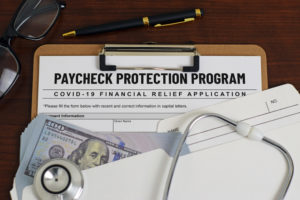PPP FAQs – Takeaways for Businesses Taking a Loan
As of this posting, companies are eagerly awaiting promulgation of the Small Business Administration’s (SBA) Paycheck Protection Program (PPP) regulations. Pending those regulations, companies are making important projections and decisions without certainty regarding key aspects of the law.
“The SBA seems aware that the uncertainty preceding its PPP regulations is problematic for businesses . . . but there are still areas of ambiguity in the statute and the guidance.”
On April 23, 2020, the SBA, in consultation with the Department of the Treasury (DOT), issued additional guidance in the form of Frequently Asked Questions (FAQs) to provide clarity on some aspects of the PPP while it prepares comprehensive regulations. Many of the Q&As address lender issues, but there is information for borrowers as well. Takeaways for businesses who have obtained or are seeking a PPP loan include the following:
- The CARES Act suspends the standard requirement that a borrower be unable to obtain credit elsewhere. But the guidance emphasizes that companies must certify in good faith that “‘[c]urrent economic uncertainty makes this loan request necessary to support the ongoing operations of the Applicant.’ . . . For example, it is unlikely that a public company with substantial market value and access to capital markets will be able to make the required certification in good faith,” and any such company that takes a loan should be prepared to defend its certification. Any borrower who applied for a PPP loan before this guidance and repays it by May 7, 2020, will be deemed to have certified in good faith.
- This FAQ seems to respond to media scrutiny of larger companies like Ruth’s Chris and Shake Shack taking and returning PPP loans.
- Some commentators, like the Wall Street Journal editorial board, have panned the guidance as attacking businesses for following the rules that the government itself created.
- It is important for borrowers to act in good faith. But the statute does not create a stringent standard limiting the PPP to companies in only the most dire financial circumstances. While it may be prudent for some larger, publicly traded companies to consider repayment by May 7, this language should not scare smaller, private businesses experiencing genuine financial uncertainties into immediate repayment. Companies should seek counsel on how this guidance applies to their businesses.
- The CARES Act excludes employee compensation in excess of $100,000 annually from its definition of “payroll costs.” This applies only to cash compensation. It does not include
- Contributions to retirement plans;
- Healthcare benefit payments and insurance costs; or
- Payment of state or local taxes on employee compensation.
- PPP payroll costs include leave, excluding sick and family leave under the Families First Coronavirus Response Act (FFCRA), for which employers receive a tax credit.
- Payments to sole proprietors or independent contractors are not included in a company’s payroll costs, as they are eligible for their own PPP loans.
- PPP loans are calculated on a gross basis without consideration of federal taxes imposed or withheld. Accordingly, payroll costs are not reduced by federal taxes on the employee withheld by the employer, nor do they include the employer’s share of payroll tax.
- The 8-week PPP forgiveness period begins the date that the lender makes the first disbursement to the borrower.
 The SBA seems aware that the uncertainty preceding its PPP regulations is problematic for businesses. It emphasized that “Borrowers and lenders may rely on this guidance . . . as SBA’s interpretation of the CARES Act and of the [PPP] Interim Final Rule. The U.S. government will not challenge lender PPP actions that conform to the guidance, and to the PPP Interim Final Rule and any subsequent rulemaking in effect at the time.” That is reassuring as far as it goes, but there are still areas of ambiguity in the statute and the guidance. Companies should consult with counsel to ensure compliance to the extent possible during this period. A year from now, with the benefit of hindsight, the tone from the Department of Justice may be less forgiving.
The SBA seems aware that the uncertainty preceding its PPP regulations is problematic for businesses. It emphasized that “Borrowers and lenders may rely on this guidance . . . as SBA’s interpretation of the CARES Act and of the [PPP] Interim Final Rule. The U.S. government will not challenge lender PPP actions that conform to the guidance, and to the PPP Interim Final Rule and any subsequent rulemaking in effect at the time.” That is reassuring as far as it goes, but there are still areas of ambiguity in the statute and the guidance. Companies should consult with counsel to ensure compliance to the extent possible during this period. A year from now, with the benefit of hindsight, the tone from the Department of Justice may be less forgiving.
Photo By Castleski from Shutterstock





